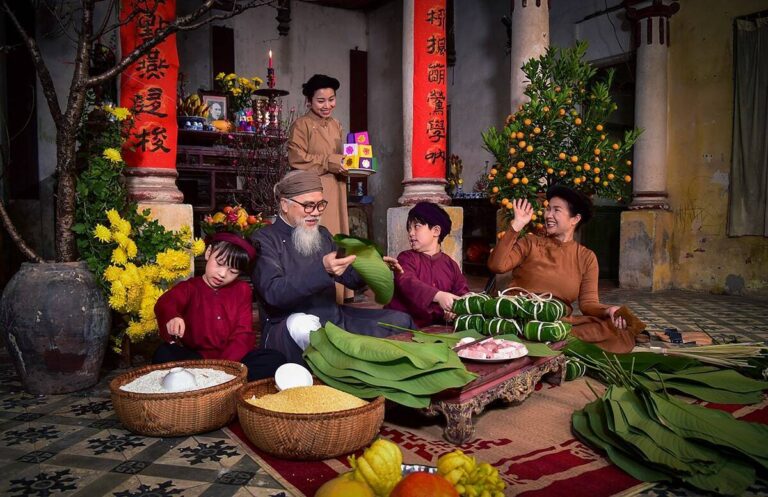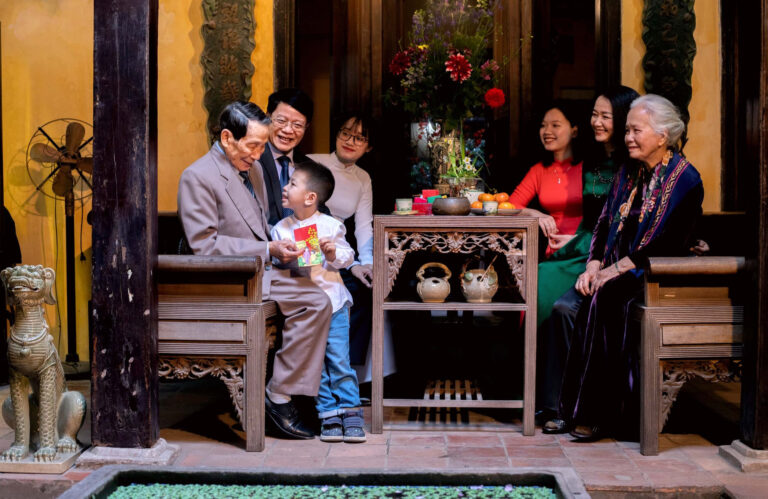Embracing Tradition: Celebrating Lunar New Year in Vietnam
Lunar New Year, also known as Tết Nguyên Đán, is a significant and cherished traditional festival in Vietnam. It symbolizes the arrival of spring and is a time for family reunions, honoring ancestors, and embracing new beginnings. The festival typically occurs between late January and mid-February, following the lunar calendar.
The origin of Tết Nguyên Đán
According to ancient texts, the first day of the year was called Nguyen Dan, signifying the early morning at the beginning of the year. Tet begins on the first day of Lunar January, marking the start of a new year and a new farming cycle. It is believed to have existed since the reign of the Hung King, as per the legend of “Banh Chung – Banh Day” with the legend Lang Lieu and chung cake.
Traditional Customs and Celebrations
During Tết Nguyên Đán, streets are adorned with vibrant red and gold decorations, symbolizing good luck and prosperity.
Families engage in cleaning and decorating their houses to prepare for the Ong Cong – Ong Tao Festival on the 23rd day of the last lunar month.
From the 23rd to the 30th day of the last lunar month, family members come together to visit their ancestors’ graves and invite them to celebrate Tet with their families.
The Lunar New Year menu in Vietnam varies by region and includes typical dishes such as banh chung, banh tet, palanquin, frozen meat, fried spring rolls, pickled onions, and bitter melon soup.
Banh Chung – Banh Tet is an indispensable dish during the Lunar New Year in Vietnam. The tradition of wrapping Banh Chung-Banh Tet during the Tet holiday has become a cherished cultural hallmark of the Vietnamese people, passed down through generations, showcasing the beauty of wet rice civilization.
As Spring arrives, families come together to wrap banh chung and offer the cake to their ancestors’ altars, following ancient traditions. According to these beliefs, Tet banh chung symbolizes the harmony of heaven and earth, conveying the hopes of people and families for a prosperous, peaceful, and joyous new year. Made with sticky rice soaked overnight, the filling consists of green beans and pork belly. Once the cake is wrapped and steamed, it acquires an incredibly delicious and unique flavor.

In addition to banh chung and banh tet, the five-fruit tray is an essential feature on every family’s altar during Tet. It not only creates a warm atmosphere in the house but also symbolizes best wishes for the new year. The Lunar New Year menu in Vietnam varies across the South, Central, and North regions, each offering typical dishes such as banh chung, banh tet, fried spring rolls, spring rolls, pickled onions, and bitter melon soup. These dishes are indispensable components of the New Year’s feast, representing the rich culinary traditions of the region.
Celebrate New Year Eve
For Vietnamese people, the Lunar New Year is an occasion for family reunions after a year of hard work. No matter how busy it is, Lunar New Year is always a time when people manage to arrange their work to return home.
On the last day of the year, families gather for a reunion feast, look back the passing year, and participate in cultural performances and dragon dances. The festive atmosphere is enlivened by fireworks, music, and traditional games.
As the clock strikes midnight, signaling the arrival of New Year’s Eve, it marks a significant transition from the old year to the new year. The night sky comes alive with vibrant fireworks, symbolizing best wishes and hope for the year ahead. New Year’s Eve is also a time for prayer and visits to pagodas, as people seek blessings for a healthy and prosperous new year. It is a time of reflection, celebration, and anticipation for the opportunities that the new year will bring.
Another interesting aspect of the Lunar New Year is the tradition of “breaking ground” at the beginning of the year. This custom, also known as “first footing,” has a long-standing history in Vietnam. According to ancient beliefs, if the first person to wish the family a Happy New Year is of the same age as the homeowner, it signifies abundant luck and fortune for the homeowner throughout the year.
After New Year’s Eve, everything in the house is considered new, and homeowners pray that someone will bring luck and prosperity to the family at the beginning of the year. As a result, the first person to visit the house and offer New Year’s wishes is highly respected and holds great significance for the year ahead.
Happy New Year: Lucky Money
The custom of lucky money (Lì xì) takes place during the early days of the traditional Lunar New Year. It originated from neighboring China. Giving lucky money to others on Tet occasion is like giving good wishes to the person you give lucky money to, wishing them good health and good luck in the new year.

In the past, lucky money was only given to children on Lunar New Year, but today, anyone can receive lucky money. Young people will also give lucky money to the elderly with the meaning of wishing them a long life and always be healthy and peaceful.
In addition to gathering with family and friends on Lunar New Year, Vietnamese also organize a party with neighbors living in the surrounding neighborhood, eat, drink, and chat together. This will be an unforgettable memory on New Year’s Day when everyone sits together to talk in a bustling atmosphere that will create a joyful new year.
Lunar New Year in Vietnam offers a unique opportunity to experience the country’s rich cultural heritage.
From the colorful parades to the elaborate rituals, Lunar New Year showcases the beauty of Vietnamese traditions and values. Visitors can immerse themselves in the festive spirit, explore local markets selling traditional goods, and witness the artistry of Vietnamese craftsmanship through intricate decorations and handicrafts.
Happy Lunar New Year! Chúc Mừng Năm Mới!
 Find Us
Find Us
Hanoi: No 3, Alley 12/70 Dang Thai Mai, Quang An, Tay Ho district, Hanoi
Sapa: 15 Le Van Tam Street
 Call Us
Call Us
Info & Enquiries
Monday to Friday 8:00 am to 5 pm (GMT +7) Landline +84 (0) 2473094899

